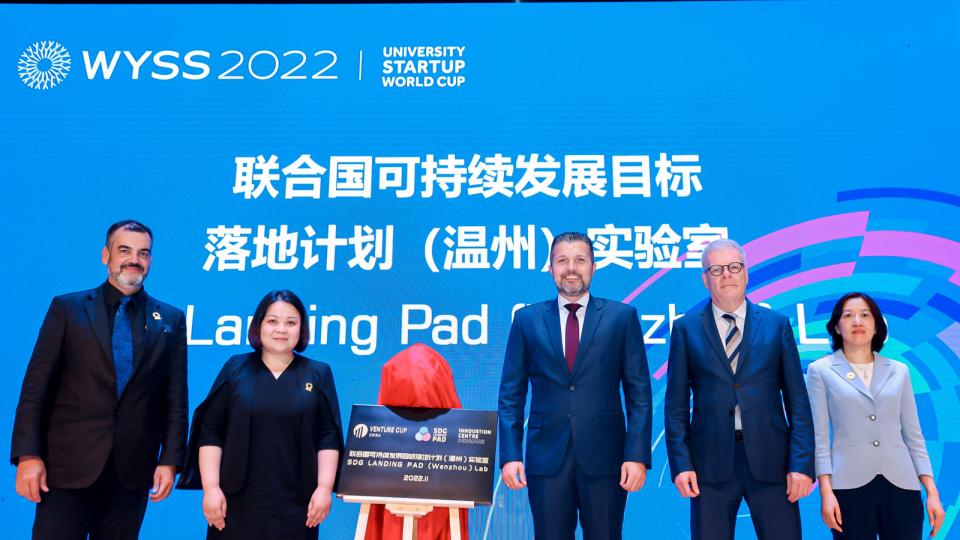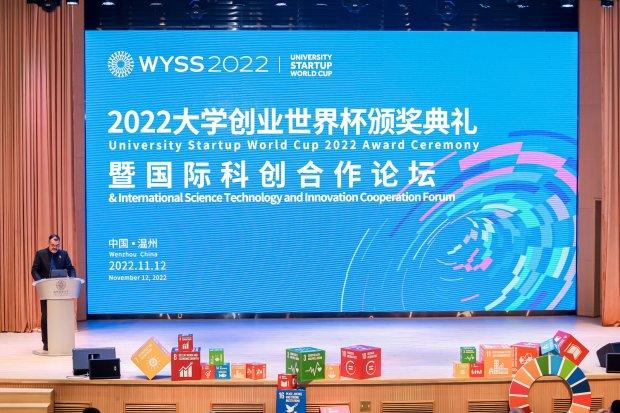On November 12th and 13th, the World Young Scientist Summit 2022 was held in Wenzhou, China. Dr. Franz Gatzweiler, on behalf of UNU Macau, attended the event.
The World Young Scientist Summit (WYSS) is jointly organized by the China Association for Science and Technology and the People’s Government of Zhejiang Province. With the vision of promoting the building of a community with a shared future for mankind and focusing on the theme of “converging the world's talents, creating a better future”, it has been held four consecutive times. In 2019, Chinese President Xi Jinping sent a congratulatory letter to the first WYSS, pointing out that “the future of science and technology lies in youth”. In 2020, UN Secretary-General Guterres sent a letter to the representatives of young scientists attending the WYSS. In 2021, the President of the International Council for Science and the President of the International Union of Pure and Applied Physics attended the WYSS.
Dr. Gatzweiler delivered a speech at this year's summit, stating that:
"We are now 8 billion on one Earth, on which we are not only more, but also more interconnected and more interdependent than ever.
That situation creates new challenges, but it also creates new opportunities.
Digitalisation has helped knowledge to spread faster than ever before and had an impact on many other aspects of human life - so much in fact, that it urges us to rethink what it means to be human in the digital age.
Innovations and creativity occur at an accelerated pace and therefore we also need think about things like new addictions, protection of privacy and identity, transparency and inclusivity.
We can observe an increase in interconnectivity and complexity, and it has been particularly well studied in cities. Usually, it is referred to as an advantage. However, there are not only advantages.
I want to share a few thoughts and suggest in which direction science and innovation may need to look, especially from a UN perspective.
The foundations on which progress and wellbeing rest are at least three - and they have not always been in an easy relationship with another: NATURE, PEOPLE and TECHNOLOGY
1st, regarding NATURE: we can no longer simply see nature as a resource to fuel our economies, including the digital economy - we need to regard nature as the foundation of life on which we are building our economies and our life; and we need to better understand the systemic and circular connections btw people and nature in order to progress. Further progress will not be achieved at the expense of nature.
2nd, regarding PEOPLE: in the past we have been taught that success comes from competition, being better, faster and smarter than other individuals, organisations or nations. While it is true that competition fuels innovation and growth, that strategy alone is exhausting itself. It is not sustainable. In fact, within our current changing global circumstances, competition alone increases the risk of peace and stability. Today we need to be better in working together. Our social capital potential is an enormous resource which still largely lies idle. Based on it we can build collective intelligence, trust, collaboration and solidarity, which is better for all.
3rd TECHNOLOGY: Technology connects us, informs us and puts us on a trajectory of accelerated learning in networks that cross borders. Technology, put into right use, can unleash the human power of collective intelligence and help us solve the challenges of a sustainable co-existence with other PEOPLE, with nations and with NATURE."

For more details of the summit, please visit: WORLD YOUNG SCIENTIST SUMMIT 2022-WYSS2022


